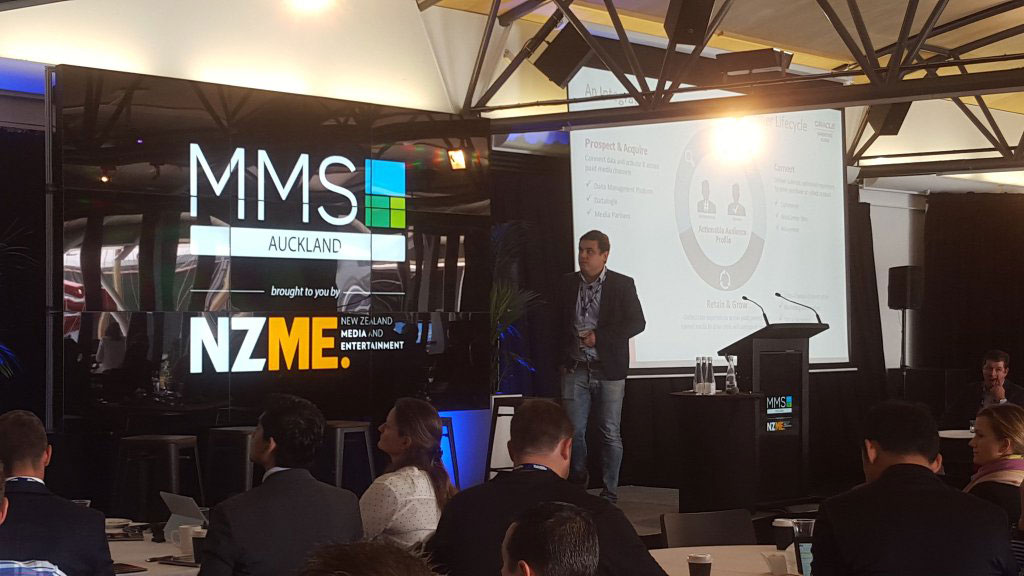Sydney-based Scott Mirabello, the principal mobile consultant at Oracle Marketing Cloud, spoke in Auckland recently about the fast-growing mobile-centric world of consumer behaviour. His focus was the value of a well-designed app.
Increasingly, he says, consumers globally are using mobile devices for retail purposes, using them for everything from pre-purchase research and product comparisons to retail transactions. The pace of this trend has caught many retailers by surprise with a large number still focused on physical stores and online initiatives.
Mirabello says mobile marketing is another channel to be included in the overall marketing mix and for retailers to be successful it needs to be an integral part of their marketing strategy. “Initially mobile marketing efforts relied on consumers using a browser on their chosen device in the same way they did when using a PC – by seeking out and interacting with a retailer’s website,” he says. “This is proving not to be the case with the arrival of the app.
“A well-designed app allows a retailer to have a much better relationship with their customers.”
Mirabello agreed to a long-range Q+A session with M+AD.
Air NZ leads the way
Who are the early adopters of digital marketing in New Zealand and how significant has its implementation been?
Air New Zealand have been one of the brands at the forefront of digital marketing in New Zealand. Their principle of being the customers’ choice of airline has been about creating a great customer experience and marketing is a core component of that.
For years now, their pre-flight programme has been successful. The goal has been about providing timely information to their travellers as they prepare for their trip, but also taking that engagement to provide additional relevant offers.
The Air New Zealand mobile app has met the increasing expectations of the mobile travel consumer that demand seamless, high-quality mobile experiences head on. They are providing important updates around their customers bookings including the weather of their destination.
Once at the airport, they are building engagement with their airpoints members through the unique way a member can order their coffee through the app enroute to the lounge and they receive a notification once it is ready. As a travel marketer, the opportunity to maximise each and every mobile moment has never been more important.
What impact are consumers’ increasing mobile centric behaviour having on retailers?
It’s not enough to say mobile is big any more; it’s simply changed human behaviour. It’s fragmented the consumer journey into hundreds of real-time micro-moments, and each of these is a critical opportunity for brands to shape their consumer’s decisions.
Today’s customers are meandering from channel-to-channel at any moment as they interact with a brand. They may start on the online store or app to view an item but then also head into the store to try on and ultimately make that purchase. Marketers are struggling to scale to the vast, unstructured nature of modern customer interactions.
What consumers really want
It has changed what we as consumers expect of brands. Consumers want what they want quickly, even if they’re not yet ready to buy. The speed in how we use mobile devices for everyday tasks has resulted in our expectation that interactions with retailers will be just as fast, seamless and satisfying, too.
On such a personal channel, consumers’ patience is low – nearly 35% of consumers that receive mobile marketing messages from brands say that messages are irrelevant (Responsys Study). Mobile experiences cannot be truncated any longer, consumers want to pick up where they left off and when they are ready to buy, the mobile experience needs to be as frictionless as possible.
How important is Mobile Marketing in an organisation’s marketing strategy?
Irrespective of business size or access to resource, it is critical that brands optimise their mobile experience for consumers. Mobile can no longer be considered as a separate platform, but rather as the glue that ties other parts of a bigger picture lifecycle marketing campaign together.
The key value proposition of mobile is really orchestration. In a recent State of ANZ Marketing Technology 2016 report by Squiz, 52% of New Zealand marketers felt they need to understand marketing automation better. Brands can no longer just focus on automating what activities would lead to a transaction, but can drive so much more value by focusing on the behaviors that happen between a transaction.
How important is an app to successful mobile marketing?
There is continuing debate over whether to invest in a mobile app or ensure a brand has a mobile friendly website. Some of the decisions are based on budget and resource, but some of them are still based on the misconception that an app is merely an alternative to the mobile website.
High NZ smartphone numbers create opportunity
An app is for the brand’s loyal customers who have a smartphone and have made a decision that there is value in downloading and interacting with your app. New Zealand has one of the largest penetration of smartphones globally, with an expected 79% in 2016 (eMarketer, April 2016), so the opportunity size for New Zealand brands is far greater than many.
Once a customer has downloaded the app, a brand can cultivate a much more intimate relationship with their customer with direct access to a mobile device. Merely building an app is no guarantee of its success however. It is critical that brands put together an effective adoption strategy through the other channels at their disposal.
For example, taking an event such as a mobile web purchase to deliver a SMS with a link to the app store has seen dramatic increases in adoption due to its timely (at time of purchase), contextual (only those who have not installed app) and frictionless (delivered on the mobile decide and one click to download) nature.
How can retailers use apps to develop a richer customer experience?
The app becomes an unprecedented targeting and data-collection opportunity. This creates a new opportunity to add to the single view of a customer. Pulling granular user data from the app, but also powerful data and intelligence that is collected via the rest of a brands marketing platform, CRM, and web behaviour analytics, can deliver snackable content that offers valuable information rather than pushing a sale.
Push & in-app messaging are most successful when used together as part of an overall marketing strategy. The ability to provide personalised deep links to the relevant product or location within in the app in tandem with one click sale capabilities will help drive quicker and higher conversions.
A smart app gives users an edge
Today’s consumer has a “you better know me” attitude and for marketers looking to survive and grow in a cross-channel world, the app provides an ability to up their game.
What business benefits can location-based marketing have on retailers and customers?
Mobile apps can deliver even more value to retailers and their customers when the additional data layer of location is added to the mix. Location-based marketing allows messages and interactions to be tailored based, not only on collected data, but also on where the customer happens to be at a particular time.
The use of location could happen on a scale dependent on brands requirements and level of sophistication. At its most basic, just knowing a travelling customer’s last known location can add value, so we have the ability to send relevant offers to those located in Auckland; or connecting online to offline in retail through driving customers to their local store.
As capabilities grow, so do the opportunities such as use of geofences to drive foot traffic; or beacons to further personalise an in-store experience for a customer through offers or through service, alerting staff a customer has arrived to pick up an order.
Thank you.
Share this Post




